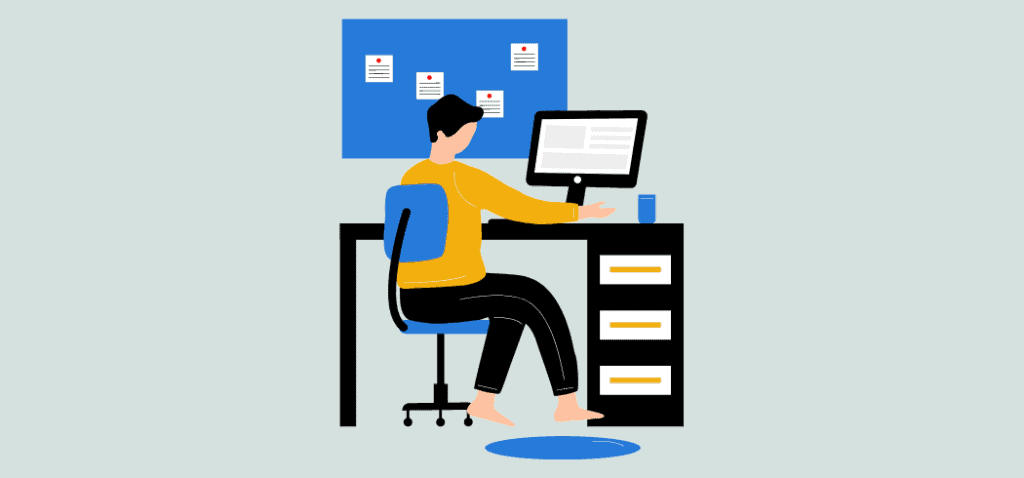Proofreading is the process of reading a piece of text and carefully checking for errors. This process usually occurs before submitting, presenting, or publishing the document.
No matter what your profession is, proofreading is critical to every profession because everybody writes. I’ll show you 17 essential proofreading skills and how you can enhance them.
How You Can Proofread Effectively
The act of proofreading occurs after editing. Proofreaders focus on surface-level errors like grammatical errors, misspellings, and formatting issues. One way to proofread effectively is by reading the paper aloud to check how it sounds on paper.
Double-check the following writing features:
- Spelling.
- Verb tenses.
- Preposition use.
- Proper names.
- Punctuation.
- Citation.
- Font.
- Page numbers.
- Header and footer.
Another proofreading technique you can try is reading backward. The brain sometimes has an auto-correct function that doesn’t let you see errors, especially misspellings. It also helps to proofread only one kind of error at a time.
If you want to be a quicker proofreader, try evaluating the texts you work with. Make a list of errors commonly made by the writer, then prioritize them while performing your task.
Make sure you have your resources close to you if you’re unsure of any error. A dictionary will help you find a term’s correct spelling and meaning. Other helpful tools include a thesaurus, style guide, and punctuation book and orther proofreading books.
17 Crucial Skills You Need to Be a Proofreader

Let’s explore these 17 skills you need before becoming a proofreader.
Know When to Ask for Help
You can be at the top of your game and have access to all the best tools, but sometimes, the best tool in your arsenal is a second set of eyes. When you’ve run through your checklist, used Grammarly, and proofed it yourself, fire it over to a friend or colleague and have them check it over. Sometimes, a fresh look can spot something you missed.
Easily Find and Correct Issues with Capitalization
Aside from getting a grasp of language, it would help if you also made it a goal to correct a wide range of capitalization errors. It’s one of the few writing skills we tend to overlook because capitalization doesn’t completely change a sentence’s meaning.
However, proper capitalization is integral in providing precise information. It also indicates professional and accurate writing.
Language experts agree that capitalization is essential to communicate particular terms to readers. For instance, we should always capitalize proper nouns to indicate their specificity.
Another rule is always to capitalize the first letter of a sentence’s first word. Doing so indicates the start of a new statement, idea, or thought.
Proofreaders focus on every word when fixing capitalization errors. Make sure to perform this technique when offering proofreading services.
A Grasp on Spelling and Punctuation
Correcting punctuation mistakes on a document is also part of the proofreading process. Proper punctuation is one of the basic skills that everyone should learn in high school. It helps you relay your message to your reader through stops, pauses, questions, etc.
But some punctuation rules can be complicated even after taking English classes. Some rules depend on the style guide you’re using, such as the use of the Oxford Comma.
Expert editors should know whether they should use parentheses or em dashes to separate additional information. Understanding the difference between a hyphen, en dash, and em dash is also part of excellent proofreading skills.
A skilled proofreader knows how to find spelling errors in a piece of writing quickly. They know online editing tools and spell checkers are insufficient to spot these errors. Only an excellent human proofreader or editor can spot contextual misspellings.
Network with Others in Your Community
As proofreaders, editors, and writers, we tend to be the solitary type. But finding and building a community of others in your field can aid you in your business. Swap notes, gain leads, learn tips you never knew before, and have a support system.
Use Software as Aids, Not a Means
There’s no avoiding the rise of tech and writing software. The trick is knowing how to work WITH it to make your job easier. Tools like Grammarly Premium and ProWritingAid are geared toward writers, but they can service as one of many lines of defense for proofreaders.
Be a Master of Your Computer Skills
Aside from linguistic skills, a proofreader should also know how to use digital tools to make editing easier. Proofreaders must know how to use spelling, grammar, and style checkers to look for linguistic errors in a piece of writing.
Some common mistakes they can spot on online documents include misspellings, grammar errors, and style mistakes. Grammarly and ProWritingAid are two special software programs you can try.
Grammarly uses artificial intelligence to check more than just spelling and grammar. It also detects the tone and style of the message. This online writing assistant also suggests sentence rewrites for lengthy sentences.
The only downside to these AI writers and editors is their inability to spot contextual errors. They also can’t fully make suggestions based on the editorial style preferences of your clients.
Knowledge of PDF markup tools is also one of the industry-specific proofreading skills you need. Some software programs you might use include Adobe Acrobat Reader, Nitro Reader, and PDFelement Pro.
Concentrate!

Being a successful proofreader is more than just having a solid command of language. A certain degree of focus is essential to make the writing process more time-saving.
Don’t let an email or SMS notification instantly take away your concentration on the texts you’re proofreading. Being constantly distracted will make you unable to spot acute errors. You won’t be able to finish your work on time, and your future employer will not appreciate it.
Stay focused for a long time, but don’t forget to take frequent breaks. Try the Pomodoro Technique so as not to prolong your break time. This system includes 25 minutes of working and then a 5-minute break.
Know Your Plate Size
As creatives, it’s easy to get carried away, especially when we work for ourselves. I know I’m guilty of loading up my plate with more work than I can handle.
If you’re self-employed, you never want to say no to a potential new client or the promise of extra work. But it can actually do more harm than good. KNowing when to say no is an essential skill for proofreaders if you ask me.
Having a manageable workload gives you the space to focus and do a better job instead of rushing and possibly missing things.
It’s All in the Details
Proofreaders have ninja-like skills that allow them to finish their jobs on time. They know how to spot misspellings and grammatical errors with just one look at the paper. One of the essential steps to finding them is reading line by line.
If you have enough industry experience, you should make corrections one at a time. For instance, you read the paper line by line for incorrect spelling. Then, you give it another read for punctuation mistakes, and so on. It’s one of the most essential steps to polishing the text.
Don’t entirely rely on online grammar checkers, as they sometimes make improper corrections. They also cannot make suggestions based on different editing styles. Knowing how to edit content for language errors will give your reader a desirable experience.
Top-Notch Communication Skills
You can’t just accept a job or project, do the work, and hand it back. You need to communicate with employers and clients in a practical but respectful way. Figure out a way to deliver information and criticism in a way that seems constructive and professional.
I can’t even guess how many people I’ve stopped working with over the years simply due to their poor communication skills. This is definitely a crucial skill to hone.
Learn to Be Independent and Be Okay with It
If you’re a social butterfly, I’m sorry to report…this line of work is pretty lonely. So, you should know how to work alone with an array of texts, including financial texts, novels, nonfiction, and legal writing.
It’s not enough that you have a good grammar game. Freelancers have greater professional independence, so they must know how to create schedules, set rates, and pay taxes independently.
Always create SMART goals for your proofreading projects. This acronym stands for systematic, measurable, attainable, relevant, and time-bound. You must meet deadlines, set timelines, and communicate with your client.
Set additional goals for yourself and your proofreading career. Set a specific week to enroll in a proofreading course, so you can keep enhancing your skills.
Have the Right Tools

Every job is easier to manage when you have the right tools in front of you. Now, that doesn’t mean you need to run out and buy all the best software and fancy pens you can find.
For example, the right tools for me are ones that help keep my thoughts and tasks organized. Notepads, spreadsheets, calendars, and checklists are at the top of my list for must-have tools for proofreaders.
Also, having access to editorial style manuals, including the ACS Style Guide, AP Stylebook, APA Style, and the ISO 690 are important.
Marketing Skills Wouldn’t Hurt
This one is two-fold. As a proofreader, your job isn’t marketing; that’s pretty evident. However, a good understanding of how marketing works can definitely help you do your job. How? Two ways:
Let’s say you have a client who needs you to proofread a series of emails for a marketing campaign. A general knowledge of what to look for would be good.
The second way marketing comes into play here is for yourself. No one will know you exist if you don’t do some level of self-promotion. Learning how social media marketing works could mean the difference between a steady flow of work and a constant grind.
Learn to Navigate Job Boards
This isn’t directly tied to your ability to do your job, but if you’re self-employed and are responsible for generating your own leads, studying the job boards can really help you out.
Rather than waste time and effort on advertising or cold calling, take a look at what postings might be available on the slew of freelance job boards out there.
Not only that, but spend some time learning how they work, how to apply for jobs properly, and how to manage expectations.
Manage Your Time Like a Pro
Let’s face it; working by yourself means you’re accountable for your own schedule. It also means there’s no one around to stop you from wasting time on social media.
Create a daily and weekly schedule for yourself, stick to it, and you’ll have a winning formula to get the job done.
Rest days are a critical element of work-life balance. Working all day can increase your stress and decrease your brain function. It will also make you less productive.
Learn Simple Formatting
This won’t apply to all corners of the proofreading world, but if you ever happen to work with authors or publishing companies, you’ll need a basic understanding of formatting.
Where does a proofreader come into this? Checking to ensure pages are aligned, chapter headings are capitalized and error-free, page breaks are correctly placed, etc.
Always Learning
Let’s face it, the world around us is constantly changing. Programs are always updating and improving, styles and standards are often changing to accommodate new words and techniques.
It’s important for proofreaders of every kind to always be in a state of learning. Read articles in your niche, catch the latest publishing trends, and see what others are doing. Stay in the now, and you’ll never be left behind.
Practice Your Proofreading Skills Now
Being an excellent proofreader is just not enough these days. The competition is thick, and you need to stand out by ensuring these skills are always practiced. Read, write, format, be diligent, and always be one step ahead.
